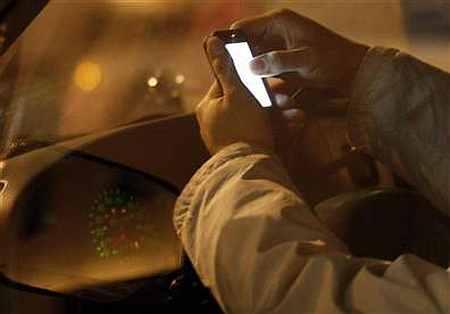
A farmer in a remote village is undergoing an electrocardiogram test. A chip inside the machine connects it to a mobile phone tower, from where the signal is relayed through a fibre optic network to a team of doctors in Delhi who observe the data and read out their prognosis.
You are an IPL buff and want to watch your favourite team in action. But on this crucial day, you are stuck in office. You get an SMS from your mobile-service operator -- it wants to know if you would like to watch the final two overs on your handset in high-definition. The charge is nominal. You type yes in reply and enjoy the game in your cubicle.
You are in a video conference with prospective business partners in Japan, but none of them knows a word of English. Worry not: the service operator will ensure you listen to them in English and they listen to you in Japanese.
...
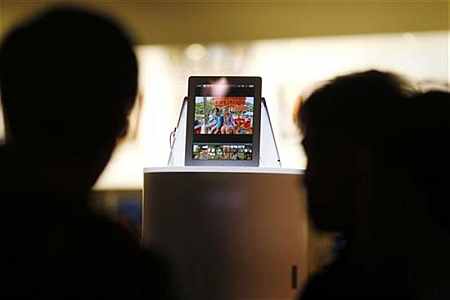
Your life is all set to change forever with the advent of fourth generation (4G) wireless broadband which offers higher speed and more bandwidth than whatever you have experienced till now.
At 100 megabits per second, 4G transfers data 10 times faster than 3G networks and many more times faster than 2G networks. A data avalanche is set to happen.
It will change the way you use your handset, watch TV and surf the Net. What else? You will be pampered with irresistible content. Tele-medicine will finally live up to its potential. Financial inclusion could improve.
...
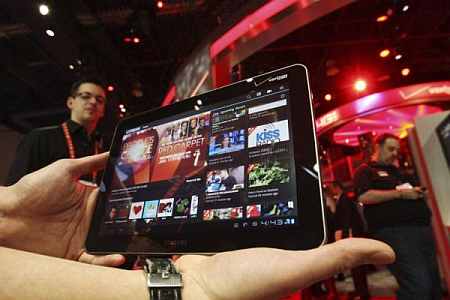
Education will become efficient. Watching movies could be different. Storage and retrieval of personal data could become easy and hassle-free. The possibilities are limitless. How soon will it happen?
Actually, it's already off the ground. Bharti Airtel, the country's largest operator of mobile telephony, has started to offer 4G services in Kolkata and Bangalore, and is likely to expand to six other cities soon.
It has paid $165 million (almost Rs 907 crore) for 49 per cent in a Qualcomm outfit in India, which has given it 4G spectrum in eight circles (the country is divided into 22 telecom circles) including Delhi and Mumbai. Says Bharti Airtel Chairman Sunil Mittal with evident pride: "India, for the first time ever, will be launching a technology shoulder to shoulder with the rest of the world; perhaps, ahead of many countries."
...
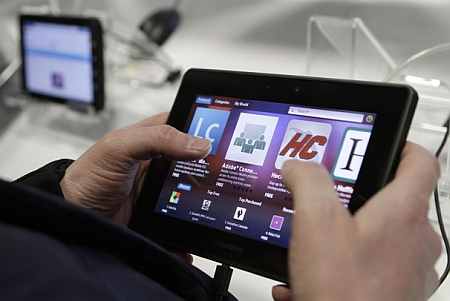
Aircel has 4G spectrum in eight circles. It will soon sign contracts to deploy 4G networks in select cities. Sundip Das, the CEO of Maxis Communications which controls Aircel, hopes to launch services by the end of the year.
And Mukesh Ambani's Reliance Industries, according to sources, is laying 200 km of optic fibre every day. The idea is to put in place a fibre-optic network of 200,000 km across the country (enough to run 142 times from Delhi to Mumbai), which will be the backbone for his 4G service -- last-mile connectivity will be wireless.
Ambani's service too is expected to happen by year-end, but in at least 100 cities, say equipment vendors who are in deep discussions with the company.
...
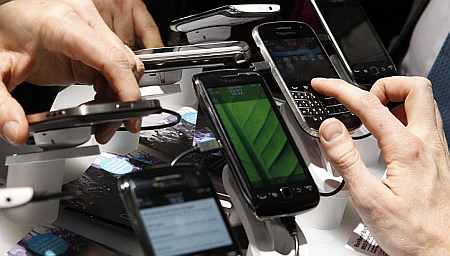
Ambani is taking up from where he had left off some years ago. (He ceded Reliance Infocomm to his brother, Anil Ambani, as part of a family settlement.) At that time, too, he had conceived a pan-India fibre-optic network with last-mile connectivity on the CDMA network. The only difference now is that the final connectivity to you will come on high-speed 4G network.
Ambani and his men are not ready to divulge their plans yet. But the vendors give out some clues. Ambani's plan, it is learnt, is to tap the 120 million-odd cable and DTH homes in India -- offer them an alternate TV platform with high-speed Internet thrown in.
He could provide you services which are not available in the country so far, like video on demand with the touch of a button rather than a cumbersome phone call, interactive programming et cetera. He could also offer high-quality TV feed (in HD) to the 800 million mobile users in the country.
...

In fact, TV and Internet are a potent combination. DTH companies cannot provide Internet, and Internet on cable hasn't caught on. This is the gap Ambani plans to fill. At the moment, the average revenue per user is around Rs 150 per month on 2G networks and Rs 400 or so on 3G networks.
Experts reckon Ambani could notch up ARPUs of at least 50 per cent more than the 3G networks by adding TV content. Of course, the TV content will have to be compelling for customers to order it on their handsets.
Those in the know say that Ambani's acquisition of a substantial stake in TV18 is meant for precisely this -- develop specialised content for his big fat data pipeline. He has also tied up with sports major IMG and is looking to create new properties which make good TV content.
...

That's perhaps why IMG has bought commercial rights, including broadcast rights, for football as well as basketball in the country.
All operators are looking at new usages which require lots of bandwidth. Cloud services could be one big thing. For instance, instead of storing your personal data like medical records in files, or on your hard disc, you could store it on the cloud maintained by the service operator and retrieve it from anywhere and at anytime. The government could upload land, birth and death records on the cloud which people could access on their mobile phones.
Education could be another big thing. For instance, Reliance Industries, through a subsidiary, has bought 38.5 per cent in Extramarks, a company which helps schools operate smart classes.
...
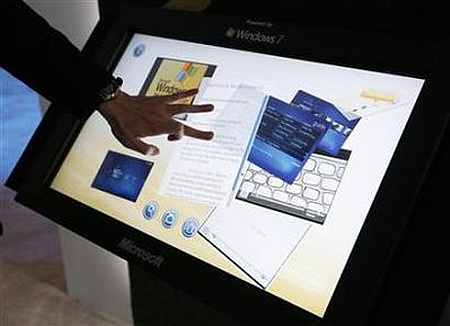
Currently, smart classes get their content on CDs which have to be physically delivered; a projector on a 4G network could ensure that a content bank on a central server can be accessed by many schools and classrooms at the same time.
But will a business model based just on data work? Most mobile telephony operators say subscribers come for voice, and the trick is to then offer them data options.
Ambani can offer voice services using the Internet, but that consumes a lot of bandwidth and there might not be enough takers.
...

If the government relaxes licence guidelines, he could use the 4G spectrum to launch voice services too. And nothing stops Ambani from buying 2G spectrum for voice services whenever it is auctioned. Or, for that matter, he could acquire a service operator!
"With technological innovation, the voice quality on 4G networks has become better. It is surely better than Skype," says A Sethuraman, executive director of Huawei Technologies, the Chinese maker of 4G equipment.
The key will be the price of the handsets and the services. "Operators," says telecom analyst Mahesh Uppal, "have to subsidise device prices to bring in customers."
...

He could be right. After all, 4G smartphones cost $350 to $500 (approximately Rs 20,000 to Rs 28,000) -- steep for a price-sensitive market like India. Or take the price of dongles: Airtel launched its 4G dongle in Kolkata for Rs 7,999, which is four times more expensive than the 3G dongles available in the market.
Worse, it is unlikely that 4G handset prices will tumble soon. Unlike 3G, which is offered on the same bandwidth of 2.1 GHz across countries (and hence handset prices have fallen to a third in the last one year), 4G is spread across different spectrum bands (2.3 GHz in India; no other country uses this band).
So, handset makers will find it hard to draw on the economies of large-scale production. And, unlike 2G and 3G networks, India is entering a technology platform right at inception -- it cannot live off inexpensive end-of-cycle equipment.
...

Handset makers, on their part, say they are working overtime to break the price barriers. Huawei says it will have a 4G smartphone in the country by year-end, possibly priced under $500 (around Rs 28,000).
Homegrown brand Lava is working with Intel, amongst others, to develop a 4G phone which it expects to showcase post-Diwali. But it will not come cheap.
"I think it will cost around $400 (about Rs 22,400) as a 4G phone has to be supported by an at least 1.3-GHz processor. Our estimate is that it might take at least two years before prices fall to $200 (around Rs 11,000)," says Lava Chairman S N Rai.
...

Some others are hopeful of high volumes soon. "If there is a sizeable demand, there is no reason why device prices will not fall below $250 (Rs 14,000 or so)," says Karbonn Mobiles Executive Director Shashin Devsare.
Vendors working with Reliance say the company wants to come out with phones that cost $100 (around Rs 5,600) at the end of one year, though the initial price will be higher.
Qualcomm has developed chipsets for devices which will work seamlessly across 2G, 3G and 4G networks -- when you move to a congested business district or need a lot of data power, the device will shift to 4G.
...
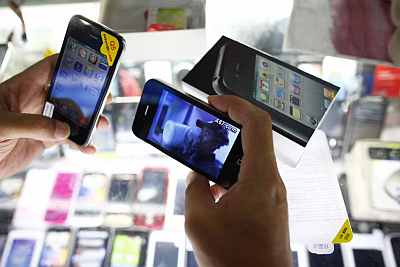
Says a Qualcomm executive: "That is why for most GSM operators 4G is an incremental business and not a standalone operation."
GSM service operators like Bharti Airtel and Aircel, who have a large base of subscribers, can upgrade their network to host 4G services with an incremental investment of 10 to 15 per cent.
Bharti Airtel CEO Sanjay Kapoor says his company will target people who want better connectivity than 3G but don't have access to fibre optic broadband -- what he calls "fibre dark spots" in a city.
...

And, because it is at the moment a high-end service, he need not spread the network thinly across the country. Content and applications, he says, are bound to follow.
Das of Aircel says that unlike voice, data usage by consumers is concentrated in one or two fixed spots, which he calls "nomadic consumption". So a wide footprint across the city, vital in voice, is not required for data.
"Surprisingly even if you are wireless your behaviour is fixed. Therefore, pan-India mobility (key in voice) is not important. Availability of services across the country is important, that's why roaming will be important," says Das.
...

Das says Aircel's strategy has to be based on the different needs of consumers. So on top of the chart would be the "rogue users" who consume a lot of data; they have to be assured speed, service and value.
Then there are low-end users who are not regulars. They have to be offered data packs in sachets like hourly passes or daily passes, depending on when they want to use the service.
"Of course, there could be some maverick in the industry who gives it all for free destroying the whole sector," adds Das. Will Reliance be that company which will break the rules? Wait and watch.